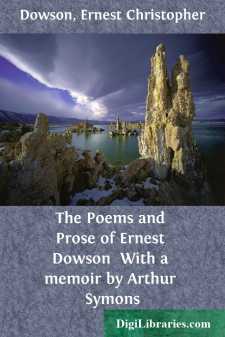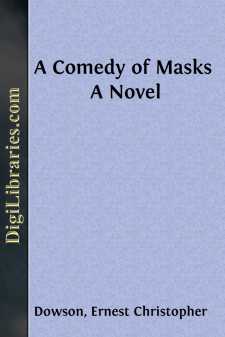Categories
- Antiques & Collectibles 13
- Architecture 36
- Art 48
- Bibles 22
- Biography & Autobiography 813
- Body, Mind & Spirit 142
- Business & Economics 28
- Children's Books 16
- Children's Fiction 13
- Computers 4
- Cooking 94
- Crafts & Hobbies 4
- Drama 346
- Education 46
- Family & Relationships 57
- Fiction 11829
- Games 19
- Gardening 17
- Health & Fitness 34
- History 1377
- House & Home 1
- Humor 147
- Juvenile Fiction 1873
- Juvenile Nonfiction 202
- Language Arts & Disciplines 88
- Law 16
- Literary Collections 686
- Literary Criticism 179
- Mathematics 13
- Medical 41
- Music 40
- Nature 179
- Non-Classifiable 1768
- Performing Arts 7
- Periodicals 1453
- Philosophy 64
- Photography 2
- Poetry 896
- Political Science 203
- Psychology 42
- Reference 154
- Religion 513
- Science 126
- Self-Help 84
- Social Science 81
- Sports & Recreation 34
- Study Aids 3
- Technology & Engineering 59
- Transportation 23
- Travel 463
- True Crime 29
The Poems and Prose of Ernest Dowson With a memoir by Arthur Symons
Description:
Excerpt
ERNEST DOWSON
I
The death of Ernest Dowson will mean very little to the world at large, but it will mean a great deal to the few people who care passionately for poetry. A little book of verses, the manuscript of another, a one-act play in verse, a few short stories, two novels written in collaboration, some translations from the French, done for money; that is all that was left by a man who was undoubtedly a man of genius, not a great poet, but a poet, one of the very few writers of our generation to whom that name can be applied in its most intimate sense. People will complain, probably, in his verses, of what will seem to them the factitious melancholy, the factitious idealism, and (peeping through at a few rare moments) the factitious suggestions of riot. They will see only a literary affectation, where in truth there is as genuine a note of personal sincerity as in the more explicit and arranged confessions of less admirable poets. Yes, in these few evasive, immaterial snatches of song, I find, implied for the most part, hidden away like a secret, all the fever and turmoil and the unattained dreams of a life which had itself so much of the swift, disastrous, and suicidal impetus of genius.
Ernest Christopher Dowson was born at The Grove, Belmont Hill, Lee, Kent, on August 2nd, 1867; he died at 26 Sandhurst Gardens, Catford, S.E., on Friday morning, February 23, 1900, and was buried in the Roman Catholic part of the Lewisham Cemetery on February 27. His great-uncle was Alfred Domett, Browning's "Waring," at one time Prime Minister of New Zealand, and author of "Ranolf and Amohia," and other poems. His father, who had himself a taste for literature, lived a good deal in France and on the Riviera, on account of the delicacy of his health, and Ernest had a somewhat irregular education, chiefly out of England, before he entered Queen's College, Oxford. He left in 1887 without taking a degree, and came to London, where he lived for several years, often revisiting France, which was always his favourite country. Latterly, until the last year of his life, he lived almost entirely in Paris, Brittany, and Normandy. Never robust, and always reckless with himself, his health had been steadily getting worse for some years, and when he came back to London he looked, as indeed he was, a dying man. Morbidly shy, with a sensitive independence which shrank from any sort of obligation, he would not communicate with his relatives, who would gladly have helped him, or with any of the really large number of attached friends whom he had in London; and, as his disease weakened him more and more, he hid himself away in his miserable lodgings, refused to see a doctor, let himself half starve, and was found one day in a Bodega with only a few shillings in his pocket, and so weak as to be hardly able to walk, by a friend, himself in some difficulties, who immediately took him back to the bricklayer's cottage in a muddy outskirt of Catford, where he was himself living, and there generously looked after him for the last six weeks of his life....



